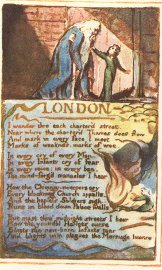Songs of Innocence and Experience Contents
London - Synopsis and commentary
Synopsis of London

The speaker wanders through the streets of London. S/he sees despair in the faces of all the people s/he meets and hears fear and repression in their voices. The woeful cry of the chimney-sweeper stands as a chastisement to the Church. The sigh of the dying soldier stains, as though with blood, the walls of the king's palace.
At midnight, s/he hears the activities of the prostitute. She curses the newborn infant - her curse, as swearing, may corrupt the child's innocence or her curse, as disease, may be the venereal infection she transmits. Certainly it is in this second sense that she blights the marriage hearse, because her customers will infect their brides, making their marriage literally deadly – the wedding carriage is thus also the vehicle taking them to their graves.
Commentary
London is concerned with actual social realities, but points beyond social evils to the workings of the human mind which give rise to them. In Tom Paine's words, eighteenth century London was:
Although Blake's London was much smaller than it is today, there were at least 50,000 working prostitutes. For an understanding of contemporary conditions, see the Social / political background > The spirit of rebellion - society > Child labour and prostitution.
A confined location
The poem's title denotes a specific geographic space, not the generalised ‘greens' of the Songs of Innocence. Everything in this urban space - even the natural River Thames - is ‘charter'd'. It exists under another's authority, is regulated, measured and mapped and a possession of the ruling system. As a result, no-one is free. Blake's repetition of this word reinforces the sense of constriction the speaker feels upon entering the city.
A de-personalised environment
The speaker remains outside, observing and commenting on what s/he sees rather than identifying with it. The verbs used are neutral in tone – ‘wander', ‘mark', ‘hear'. All the speaker's subjects - men, infants, chimney-sweeper, soldier, harlot - are known only through the marks they leave behind, or the cries they make. We never see the individuals themselves. Likewise, we see clergy and the ruling class only through the buildings that characterise their power – the church and the palace. It is not the particular human beings who are being judged here but the oppressive system with its victims, which results from the ‘mind-forg'd manacles'.
Death in life
The poem gains in intensity as it progresses, concluding with the moment in which the cycle of misery recommences, in the birth of a new human. However, here the baby speaks of blighted life, leading to death. In literal terms. sexual and marital union, which should be signs of life and hope, are tainted by the blight of venereal disease. Thus, the closing image of the ‘Marriage hearse,' is one in which love and desire can produce only death and destruction.
Metaphorically, ‘mind-forg'd manacles' produce an attitude to sexuality that makes sexual activity a thing of shame to be repressed and controlled by marriage. It also renders sexual relationships prone to possessiveness and jealousy, distorting and perverting them. Blake felt that, without such attitudes, prostitution would not be necessary. As Blake says in Proverbs of Hell:
Brothels with bricks of Religion.'
The context of Revelation
If we read the poem in relation to the evocation of the book of Revelation in the Bible, we see that the speaker is setting a perception of the historical London within an apocalyptic setting, that is, one which speaks of the end of an age or world. Being marked for salvation or damnation isn't something which belongs to a future state at the end of time. It is a present reality.
However, for Blake, damnation was not the act of an external, all-powerful God, but the consequences of people's own thinking and choices. Human beings damned themselves; they could also save themselves if they could remove those manacles and achieve freedom of vision and action.
Investigating London
- Do you think Blake is more concerned with the social evils in London or with the mental attitudes which cause them?
This is an example of apocalyptic literature, full of colourful imagery and symbolism. It contains seven letters to churches in Asia Minor (modern Turkey) who are commended for their zeal or criticised for lack of it. The overall message is that kingdom of God will triumph in the battle against evil and the book ends with a beautiful description of the Heavenly Jerusalem as the symbol of God's presence among humankind in a new heaven and earth.
Big ideas: Judgement; Dreams, visions and prophecy; Serpent, devil, Satan, beast; Apocalypse, Revelation, the End Times, the Second Coming
Recently Viewed
Related material
Scan and go

Scan on your mobile for direct link.